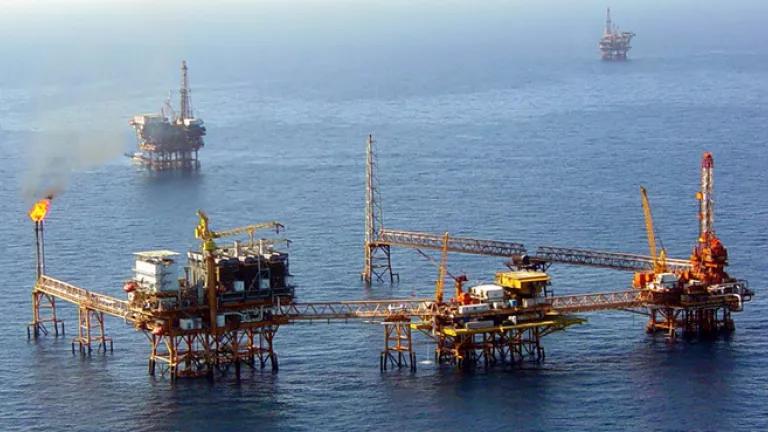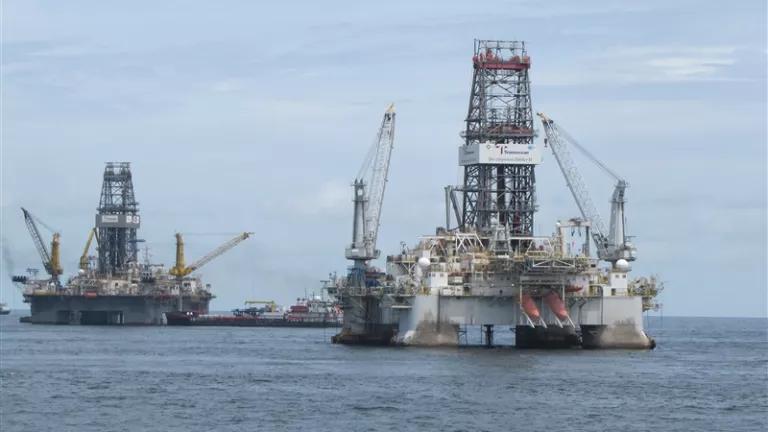Members of Congress Take Action to Protect Coastal Communities from Risky Offshore Drilling and Worsening Climate Change Impacts
This week marks five years since the BP blowout that killed 11 workers and dumped millions of barrels of oil into the Gulf of Mexico, devastating productive fisheries and coastal communities. Offshore drilling is now posing a new threat to coastal communities and rich ocean ecosystems as the Department of Interior has proposed opening up the Atlantic waters to offshore drilling for the first time since it was last tried more than 30 years ago. Fortunately, 10 Atlantic coast Senators and 14 Representatives have taken swift action by introducing legislation to prevent the irreversible mistake of opening the Atlantic to dangerous drilling and locking the nation into decades of carbon pollution.
Senators Bob Menendez, Cory Booker, Edward Markey, Sheldon Whitehouse, Richard Blumenthal, Ben Cardin, Bernie Sanders, Elizabeth Warren, Jack Reed and Barbara Mikulski have introduced The Clean Ocean and Safe Tourism (COAST) Anti-Drilling Act, which would prohibit the Department of the Interior from issuing any lease for the exploration, development, or production of oil or gas off of the Atlantic coast. And in the House of Representatives a companion COAST Act was introduced by Representatives Frank Pallone, Gerry Connolly, Bonnie Watson Coleman, Albio Sires, Bill Pascrell, Jim McGovern, Bobby Scott, Alcee Hastings, Paul Tonko, Jim Langevin, Rosa DeLauro, Bill Keating, Kathy Castor, and Mike Quigley. These Members of Congress are not only working to protect coastal economies, tourism industries, and critical fisheries-- they are also protecting our nation from the impacts of climate change that will inevitably come from opening new areas to drilling, which locks in future carbon pollution, when we should be looking to clean solutions that accelerate fuel efficiency, electric vehicles, clean fuels, and renewable energy like solar and wind.
But it's not just the Atlantic coast that is at risk. The Arctic is also on the chopping block in the Administration's draft proposed five year offshore oil and gas leasing plan. Some of the most productive marine ecosystems on Earth are found in Alaska's Arctic waters. However, these areas are incredibly fragile and would be at terrible risk if there were a spill. In the remote and challenging Arctic, even more than elsewhere, the large majority of any major spill would be completely impossible to clean up, with persistent and devastating impacts. Most of the year pack ice ends any possibility of clean up and spreads the oil. Opening the Arctic Ocean is as rash as it is unnecessary, in a world that has to move off of oil dependence rapidly or lose the fight to avoid climate chaos.
In the Atlantic, coastal economies have relied heavily on tourism, fishing and recreational industries. The BP disaster showed us just how risky drilling can be. Underscoring how foolhardy this proposal is, there have been NO major revisions to the law to increase safety since that disaster. Risking all of this, in addition to the way of life that these communities enjoy, only to secure our dependence on fossil fuels helps no one but Big Oil. This is a gamble we simply can't afford to take.
Thankfully, leaders like the Senators and Representatives who introduced The COAST Act are working to protect our future. And there is still time for the Administration to change course, protect our coasts and communities and fulfill its promise to meaningfully address the threat of climate change for future generations.
It's time to say "no" to reckless drilling that puts polluter profits first, puts the rest of us at risk, and locks the next generation into the carbon pollution trap that's driving climate change.




